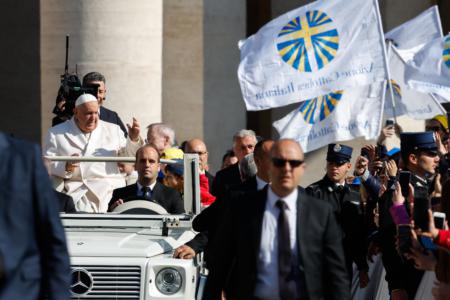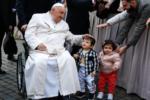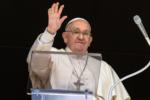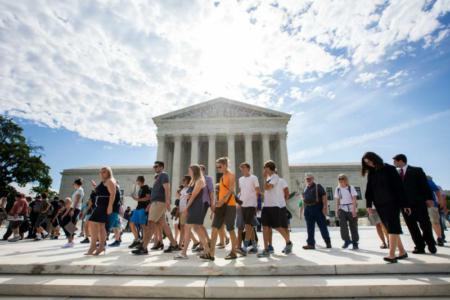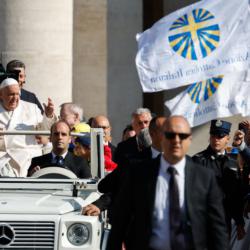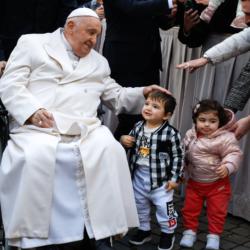As 2015 comes to close, high court says it will hear mandate appeals
LEVITTOWN, Pa. (CNS) -- Religious freedom is at the heart of the debate over the Obama administration's contraceptive mandate, according to Pittsburgh Bishop David A. Zubik and others involved in cases the U.S. Supreme Court has agreed to hear.
The perception this is primarily a Catholic issue because of the church's long-standing natural-law teaching against artificial contraception and abortion is misplaced, he told Catholic News Service.
Although contraception is "the presenting issue," he said he fears the regulations put in place by the Department of Health and Human Services in administering the health care law represent "a slippery slope" that would undermine religious freedom for many Americans.
Under the Affordable Care Act of 2010, most religious and other employers are required to cover contraceptives, sterilization, and abortifacients -- drugs and devices that work by causing early abortion -- through employer-provided health insurance.
On Nov. 6, the U.S. Supreme Court said it will hear seven pending appeals in lawsuits brought by several Catholic and other faith-based entities against the contraceptive mandate. The justices will hear appeals from groups in Colorado, Maryland, New Mexico, Oklahoma, Pennsylvania, Texas and the District of Columbia.
In 2015 several circuit courts ruled that religious entities, such as the Denver-based Little Sisters of the Poor, are not substantially burdened by opt-out procedures the federal government put in place for them to avoid the requirement to provide contraceptive coverage in employee health insurance. The Obama administration's "opt-out" requires these employers to fill out a form for HHS that states their objections to providing coverage and triggers an arrangement for a third party to provide the coverage for their employees. It is a provision they still find objectionable.
Only one circuit court, the 8th U.S. Circuit Court of Appeals, in a September ruling, accepted the nonprofits' argument that complying with the opt-out provision violates their religious beliefs.
Bishop Zubik told CNS he meets regularly with an ecumenical group of church leaders and that when he first brought the mandate issue up with them several years ago, their tendency was to consider it an issue for Catholics only. But the bishop said he asked them to think about which of their teachings or practices might be infringed upon by a similar government encroachment if HHS is allowed to continue with the contraceptive mandate, and they wound up agreeing with him that it is a broadly important issue of religious freedom.
Others have been given exceptions on other grounds, Bishop Zubik said, and "from a moral standpoint" religious beliefs and practices should be respected on religious grounds.
The Dioceses of Pittsburgh and Erie, Pennsylvania, and the Archdiocese of Washington are among numerous plaintiffs from around the country consolidated into seven cases that the court has agreed to hear -- probably in the spring -- together under the general heading of Zubik v. Burwell. Sylvia Mathews Burwell is the current HHS secretary.
Other named plaintiffs include the Little Sisters of the Poor, an international community that has served the elderly poor for 175 years, Priests for Life and a number of other Catholic and other Christian entities. Legal services are being provided by private or public-interest law firms at no cost to the plaintiffs. Many other religious bodies will be affected by the outcome of the Supreme Court case, as their cases are at various stages working their way through appeals courts.
Since the Affordable Care Act was put into place, contraceptives -- including abortifacients -- have been among the services that must be included in health insurance coverage for all women. These drugs and devices, which have the approval of the Food and Drug Administration, are already covered under Medicaid, but refusal to comply would make non-exempt employers subject to heavy fines.
A very narrow exemption, essentially including only churches and religious orders, was permitted from the start, but a great many Catholic and other religious institutions and ministries -- colleges, hospitals, charitable endeavors of all sorts -- as well as private individuals with conscience objections said they could not participate without violating their beliefs.
Robert A. Destro, a law professor at The Catholic University of America's Columbus School of Law and founding director of the Interdisciplinary Program in Law and Religion there, said that HHS requiring the Little Sisters of the Poor, for example, to "sign that piece of paper" -- the form for HHS stating their objections -- is a purely symbolic matter, designed "to establish the idea that everyone's got to chip in" to the health care system.
In fact, Destro said, "you have to follow the money to make any sense of it at all."
HHS doesn't want individual women to have to pay for contraception, can't get Congress to allocate funds for that purpose, and some employers are refusing on the basis of conscience to instruct their insurers to pay the costs. So he said HHS is taking the costs of the services out of the fees insurance companies pay to participate in state- and federally-run insurance exchanges, something HHS has no statutory power to do.
The symbolism, Destro said, is very powerful, and he believes the action was clearly aimed at the Catholic Church: "This had to have been a coldly calculated hit," he said, noting that the Catholic Church was working for widely available health insurance long before the Democratic Party was doing so. The U.S. bishops for years have advocated for access to affordable health care as a basic human right.
Daniel Blomberg, legal counsel with the Becket Fund, a public interest law firm that is representing a number of the plaintiffs in two of the seven groups of cases taken on by the Supreme Court, said the key question is "whether federal agencies can force religious ministries to violate their religious beliefs for no reason."
The applicable law is the Religious Freedom Restoration Act, or RFRA, passed by Congress in 1993 to protect the free exercise of religion. It is, Blomberg said, "always a balancing test" because it requires that if a law restricts the free exercise of religion guaranteed by the Constitution there must be a compelling government interest to do so and that even if there is a compelling interest it must not place an unreasonable burden on the religious exercise.
In the 2014 Hobby Lobby case, the Supreme Court relied on RFRA to rule in favor of two family-owned private businesses, Hobby Lobby Stores and its related chain of Christian bookstores, and Conestoga Wood Specialties, each of which proclaims its religious identity in its mission statement and objected to providing abortifacient drugs and devices as contrary to the owners' Christian beliefs.
If the Supreme Court does not rule in the religious community's favor, the Little Sisters of the Poor could face fines of $70 million every year, Blomberg continued. The government has many other ways it could provide women with contraceptives "on its own dime and its own time without forcing religious ministries to be involved."
This is a "very important" decision, Blomberg said. "Religious liberty for the rest of us is threatened" by the actions of a federal agency acting on its own. "That's a very dangerous place for us all to be." Government officials, he said, shouldn't be allowed to decide when a religious belief is serious and when it isn't.
On Nov. 18 Father Frank Pavone, national director of Priests for Life, issued a statement announcing that seven medical groups had agreed to submit friend-of-the-court briefs to the Supreme Court in support of Priests' for Life case. They include the Association of American Physicians and Surgeons, the Christian Medical Association, the National Catholic Bioethics Center and the National Association of Catholic Nurses.
Contacted by CNS for comment, the HHS referred the query to the Department of Justice, which did not respond.
